The Hampshire Congress incorporating the Hampshire Individual was held at Eastleigh College the weekend of 1st November 2002. The tournament used the same format as last year, with an Open and under 125 graded sections. Eastleigh College proved a popular venue, with ample room and good lighting available in both sections. A small increase in numbers was also seen, although it was hoped that a few more would enter.
Picture at the top is of Michael Yeo receiving the Silver Rook from the Mayor of Eastleigh.
Note: This article is mainly based on the one I produced in 2002 for the original Hampshire Chess Association website, although I have expanded some parts and I am hoping that my memories of the tournament are correct.
For a list of the winners of the Hampshire Individual Championship and links to any articles I have written the table on the Hampshire Individual Championship is the best place to look. In addition, the table on the Hampshire Tournaments will detail these and any other tournament articles I have completed. Both of these are available from the menu at the top of the site as well.
Round 1
Keeping with the tradition of the last two years, the winner of last year’s tournament (Thomas Rendle) did not enter, although the Hampshire Champion Dominic Tunks was defending his title (the tournament winner last year was not eligible for the Silver Rook trophy). Dominic took a bye in the first round as the normal top v bottom slaughter took place. As always, a couple of the lower graded players bit back, and Fraser McLeod and Ian Cary were the higher graded players who lost (Ian’s opponent was ungraded).
Ian Matthew plays very aggressive openings, but he soon has a dubious position against Fraser McLeod, after playing the Dutch defence. He got back into the game though and stood slightly better when Fraser missed a pretty combination. In the diagrammed position Fraser has just played 26.Qe3, allowing a mate in 4 with 16..Ng4. I will let you work out the mating combination yourself… (final moves after 1st round results if you struggle).
It seems that top seed Michael Yeo did not have too much trouble in the first round, but looks can be deceptive. Michael has kindly annotated his win against Joe Coburn, which shows where Joe could have improved on the actual game.
The game also follows a previous game of Michael’s, which is not that surprising, but the opponent is! I’ll let you check that one out. As I did not have the game with Michael’s annotations to copy into Chessbase I have had to re-create and due to the complexity of all the lines I have pruned it a bit. If Mike has his original and supplies, I will update.
Richard Perrin and P.Byre also did well in the first round, drawing against David Cordner and Tom Anderson respectively.
| Player | Grade | Result | Player | Grade | Result |
|---|---|---|---|---|---|
| J Coburn | 146 | 0 | M Yeo | 202 | 1 |
| D Pye | 185 | 1 | A Mills | 147 | 0 |
| A Masters | u | 0 | W Purkiss | 179 | 1 |
| J Fraser-Mitchell | 170 | 1 | G Stuart | 144 | 0 |
| LC Allen | 143 | 0 | JF Wheeler | 170 | 1 |
| K Esmat | 169 | 1 | S Gonem | 143 | 0 |
| R Perrin | 138 | ½ | D Cordner | 168 | ½ |
| ML Newbury | 165 | 1 | J Shaddick | 129 | 0 |
| P Byre | 129 | ½ | Tr Anderson | 161 | ½ |
| FN McLeod | 159 | 0 | I Matthew | 136 | 1 |
| S Nelson | u | 1 | I Cary | 151 | 0 |
| DR Tunks | 187 | ½ | Bye | ||
| R Hunt | 126 | ½ | Bye |
hxg4 Rh6+ 28. Bh3 Rxh3+ 29. Kxh3 Qh1# 0-1 was the remaining moves in the Ian Matthew game.
Round 2
As early as round two there were some heavyweight clashes, with John Wheeler v David Pye, Dominic Tunks v Martin Newbury and Michael Yeo v Khaled Esmat games being the pick of the bunch. On board one Yeo v Esmat was a real tussle, with both players holding an advantage at some stage. In the final position Khaled was going to win a pawn, but the resulting Rook and pawn ending was not winnable, so a draw was agreed. A good result for Khaled, drawing with Black against the top seed.
As mentioned above, the Wheeler v Pye and Tunks v Newbury games also looked very interesting pairings and so the games proved. John Wheeler and David Pye maneuvered their pieces until John’s attack crashed through on the Queenside, winning material and the game.
After QxQ, pxp, Nxc7 wins material
Meanwhile Martin was very late to his game (a common theme of his over the weekend) and when the game started Dominic built up a very commanding position. But then it started to go wrong, when Dominic blundered first one piece for very little compensation and then another. The game finished soon after. As I keyed the moves of this game into Chessbase, I wondered if this was just about the worst pairing from my point of view. Both Dominic and Martin have very messy scoresheets and normally I would use their opponent’s scoresheet to enter the game. This of course was not possible for this game, so not surprisingly I don’t have all the moves. I could hardly decipher 10 moves, let along the full 24 moves.
After a number of fine performances in the Hampshire Championship (three times a champion), it seems Dominic was due a poor tournament, was the loss to Martin the start of this?
| Player | Grade | Result | Player | Grade | Result |
|---|---|---|---|---|---|
| M Yeo | 202 | ½ | K Esmat | 169 | ½ |
| JF Wheeler | 170 | 1 | D Pye | 185 | 0 |
| W Purkiss | 179 | 1 | S Nelson | u | 0 |
| I Matthew | 136 | 0 | J Fraser-Mitchell | 170 | 1 |
| DR Tunks | 187 | 0 | ML Newbury | 165 | 1 |
| D Cordner | 168 | 1 | P Byre | 129 | 0 |
| TR Anderson | 161 | 1 | R Hunt | 126 | 0 |
| I Cary | 151 | 1 | R Perrin | 138 | 0 |
| G Stuart | 144 | ½ | FN McLeod | 159 | ½ |
| A Mills | 147 | 1 | J Coburn | 146 | 0 |
| S Gonem | 143 | ½ | LC Allen | 143 | ½ |
| J Shaddick | 129 | 0 | A Masters | u | 1 |
Round 2 Table
| Name | Score |
|---|---|
| Bill Purkiss | 2 |
| John Wheeler | 2 |
| Jeremy Fraser Mitchell | 2 |
| Martin Newbury | 2 |
| Khaled Esmat | 1½ |
| Michael Yeo | 1½ |
| Tom Anderson | 1½ |
| David Cordner | 1½ |
Round 3
You often find that games where players are of roughly the same standard are either long hard games, or short draws. The board one clash between Bill Purkiss and Jeremy Fraser-Mitchell was neither of these, with Bill winning in 15 moves.
It seems that Jeremy played a dubious move in the opening (7.Qb3) and after Bill’s reply Nxd4, decided to really mix it up with 8.Bxf7, rather than move his Queen back to d1, where he obviously stood worse. After this Jeremy then sacrificed his Queen for two Knights, for which he was never going to get enough compensation and resigned soon afterwards. This meant that the board one game was the first to finish and Bill was on maximum points.
Joining Bill on three points was John Wheeler, who beat Martin Newbury. These were the only two players on maximum points and in fact they were one point ahead of their nearest rivals, as none of the players on one and a half points won their games.
Michael Yeo and David Cordner had a very interesting ending arising, where Michael was left with two Knights and David had a pawn. In certain circumstances this is a win for the player with the Knights, as he can avoid the stalemate, due to the pawn having to move. Not this time though, as the pawn was too far advanced.
If you are interested in seeing a position where this was achieved, I found the following game where GM M.Gurevich mates GM Ian Rogers. I would hate to get this with a lot of time, let along having no time at all, which is the situation Michael Yeo was in. Mind you, at least you know you can’t lose from this position.
On the lower boards it seemed that Dominic Tunks chance of retaining his title was over, as he drew with Les Allen, certainly a good result for Les though.
Fraser McLeod played the same opening as White against Sherif Gonem, as I had faced from Jeremy Fraser-Mitchell in round one. Sherif succumbed even quicker than me, as he was overwhelmed on the Kingside. In the position in the diagram Fraser played 18.Bxf6 and Sherif replied by taking the Knight on c3, which allowed Fraser to play 19.Qh4 and achieve a mating attack.
In fact, if Sherif had played 18…Bh6, rather than taking the Knight straight away the forced variation 19.Bg5 Bxg5 20.Qxg5 bxc3 would have left him in a worse position but by no means losing.
I had a narrow escape, from a much worse position against Peter Byre where his two Bishops dominated the board. He then won the exchange, but at least this was for one of his Bishops. I managed to win in the quickplay finish, when Peter dropped the exchange back, leaving me with a won ending – a very lucky escape.
A bit of a swindle to win with Black from this position
| Player | Grade | Result | Player | Grade | Result |
|---|---|---|---|---|---|
| J Fraser-Mitchell | 170 | 0 | W Purkiss | 179 | 1 |
| ML Newbury | 165 | 0 | JF Wheeler | 170 | 1 |
| D Cordner | 168 | ½ | M Yeo | 202 | ½ |
| K Esmat | 169 | ½ | TR Anderson | 161 | ½ |
| D Pye | 185 | ½ | I Cary | 151 | ½ |
| A Masters | u | 1 | I Matthew | 136 | 0 |
| S Nelson | u | ½ | A Mills | 147 | ½ |
| LC Allen | 143 | ½ | DR Tunks | 187 | ½ |
| FN McLeod | 159 | 1 | S Gonem | 143 | 0 |
| P Byre | 129 | 0 | G Stuart | 144 | 1 |
| R Hunt | 126 | ½ | R Perrin | 138 | ½ |
| J Coburn | 146 | 0 | J Shaddick | 129 | 1 |
Round 4
The fourth round being Saturday evening you normally only see the die-hards playing, which is why you won’t have seen me. In fact I was at a firework display, getting soaked, but still enjoying the spectacle, as other players were toiling away at their chess boards. This also guarantees me at least half a point from the championship, which if you’re having a bad tournament is always useful.
John Wheeler may not have had the same reasons as me for taking a bye, but he also did not play Saturday evening and so Khaled Esmat received the upfloat to play Bill Purkiss. If Bill could win this game, he would be in a commanding position, going into the last day. But it was not to be and a fine game by Khaled saw him defeat Bill, after sacrificing a pawn (for what seemed to be little compensation) in the opening.
I feel for Bill here, as this was probably his best chance to win the Hampshire Championship. If he had won this game, he would have gone into the final day on four points although he would have had tough opponents ahead, but the all-important tie-break would have been in his favour.
All the Saturday evening games were decisive, as players fought for every scrap. You had to feel sorry for J.Shaddick, who would have thought that with one point from three games, he would not be facing the 2nd seed and three-time champion Dominic. He still did well, holding out for 49 moves, for which he had the better position for quite a lot of the game.
Without wishing to pick on Sherif Gonem, his game against Joe Coburn was a real struggle, but from a lost position he missed a chance to snatch a draw. In the diagrammed position, Sherif playing White was a piece down and played 38.Qxc3 and lost 20 moves later.
What he missed, which with the time control being move 40 was probably understandable was 38.Rxh6+. This seems to net him the half point as after 38.Rxh6+ Kxh6 39.Qd6+ Kh7 40.Qxe7+ Kg8 Black does not seem to be able to escape the perpetual check, without getting mated.
Martin Newbury played a fine game against Tom Anderson, to move into contention. He main problem now, was to make sure he arrived at a reasonable time Sunday morning!
| Player | Grade | Result | Player | Grade | Result |
|---|---|---|---|---|---|
| W Purkiss | 179 | 0 | K Esmat | 169 | 1 |
| M Yeo | 202 | 1 | A Masters | u | 0 |
| TR Anderson | 161 | 0 | ML Newbury | 165 | 1 |
| I Cary | 151 | 1 | LC Allen | 143 | 0 |
| J Shaddick | 129 | 0 | DR Tunks | 187 | 1 |
| I Matthew | 136 | 1 | R Hunt | 126 | 0 |
| S Gonem | 143 | 0 | J Coburn | 146 | 1 |
| Everyone else | ½ | Bye |
Round 5
With all to play for in the 5th round, there were a lot of hard-fought games. The board one game between John Wheeler and Bill Purkiss went the distance. I don’t know if Bill won the exchange, or John sacrificed it, but John did get some compensation for it. In the end John won the exchange back, but agreed a draw in the quickplay finish, when he had less time than Bill.
Martin Newbury was late for his game and suffered the price, losing on time against Michael Yeo from admittedly a bad position. Meanwhile Khaled Esmat was blundering all his pieces against Jeremy Fraser-Mitchell in the same way that Jeremy had done against Bill Purkiss in round three and Khaled soon resigned.
Ian Cary had the better position against David Cordner but went for what he thought was a winning combination. As he said afterwards, he had calculated a mate in three, unfortunately his opponent had a mate in two first!
In the diagrammed position, Ian played 25.Qc3, which threatens all sorts of nasty tricks. Unfortunately for Ian, after 25…Nf3 he had to resign due to the mate from 26.Rxf3..Qxh2+ 27Kf1..Qh1#
My game against David Pye had an interesting opening, but I slipped into a bad position, which went into a tricky ending. David is probably the worse person to go into an ending against, but luckily for me he went wrong and then over pressed, in trying to extract the full point. I was initially pleased with the half point, but I had miscalculated the position when offering the draw. In fact, I had a fairly easy forcing line, which would have won me the game. Still, from the position I was in 15 moves before, I could not have asked for more than the half point – so probably a fair result.
Maybe the position is not a clear win, but White has a large advantage when I offered a draw!
| Player | Grade | Result | Player | Grade | Result |
|---|---|---|---|---|---|
| JF Wheeler | 170 | ½ | W Purkiss | 179 | ½ |
| ML Newbury | 165 | 0 | M Yeo | 202 | 1 |
| K Esmat | 169 | 0 | J Fraser-Mitchell | 170 | 1 |
| I Cary | 151 | 0 | D Cordner | 168 | 1 |
| DR Tunks | 187 | 1 | I Matthew | 136 | 0 |
| G Stuart | 144 | ½ | D Pye | 185 | ½ |
| A Mills | 147 | ½ | TR Anderson | 161 | ½ |
| A Masters | u | ½ | FN McLeod | 159 | ½ |
| R Perrin | 138 | ½ | S Nelson | u | ½ |
| R Hunt | 126 | 1 | J Coburn | 146 | 0 |
| LC Allen | 143 | 1 | J Shaddick | 129 | 0 |
| S Gonem | 143 | 1 | Bye |
Round 5 Table
| Player | Score |
|---|---|
| John Wheeler | 4 |
| Michael Yeo | 4 |
| Bill Purkiss | 3½ |
| Jeremy Fraser-Mitchell | 3½ |
| David Cordner | 3½ |
Round 6
Coming into the last round whoever won the top board game would win the tournament. John Wheeler probably only needed a draw from this game to win the Silver Rook, as his sum of progressive score was the best. Bill Purkiss, Jeremy-Fraser-Mitchell and Martin Newbury had to hope that the top board was drawn and for them to win, to share 1st prize.
The Yeo v Wheeler game was quite a bit of theory, but John’s position started to fall apart when he played 13…Nc6? Instead of this 13…d5 looked stronger. This would have stopped Michael’s Knight moving to e4 where it was very dominant.
In fact, from there it moved into d6 and soon afterwards a tactical exchange won Michael a Rook and the Hampshire Championship. This was Michael’s first win of the Hampshire Championship, from 10 previous entries, but more of that later.
In the fight for 2nd place, Bill Purkiss and Jeremy Fraser-Mitchell won against Martin Newbury and David Cordner respectively and they therefore shared 2nd place.
Four players were in with a chance of the under 160 grading prize, myself, Andy Mills, Ian Cary and Fraser McLeod. Both Andy and myself had reasonably quick draws (my position was looking a bit ropey when I was offered a draw). This left Fraser and Ian fighting it out for the title, with whoever won their game, winning the prize.
The position though, was a bit comical as after a lot of manoeuvring Fraser blundered an exchange, but as compensation Ian had left himself with a knight that could not move (see diagram opposite). Fraser also had a White squared Bishop that had very little scope, as all of Fraser’s Pawns were on White squares.
In fact, this position looked so drawn I was wondering why they were playing on, but eventually Ian managed to extract himself from the position and get a winning position. Unfortunately, both players had no time at this stage and even though Ian had three pawns and a Rook against Fraser’s Rook he proceeded to blunder two of them and reach a drawn Rook and Pawn ending.
After that tremendous battle, the under 160 grading prize was shared between the four mentioned players, with Ian taking home the Len Walters Trophy on tie-break. Ian did not know that he was going to win the trophy if we all tied, otherwise he would have accepted Fraser’s drawn offer earlier on, rather than risking losing the game.
Richard Perrin did not have the same trouble in winning the Under 140 grading prize and Peter Marshal Cup, as Ian Matthew sacrificed unsoundly against him and lost in 25 moves.
So, back to the main prize. As mentioned above, Michael Yeo’s win against John Wheeler meant he had won the championship at his 11th attempt. Michael was the only undefeated player in the Open Championship and his win was well deserved. All of his games were hard fought and his last round win, ensured he won the trophy in style. It was also pleasing to see that the winner of the tournament, was also the winner of the Hampshire Individual Trophy.
| Player | Grade | Result | Player | Grade | Result |
|---|---|---|---|---|---|
| M Yeo | 202 | 1 | JF Wheeler | 170 | 0 |
| J Fraser-Mitchell | 170 | 1 | D Cordner | 168 | 0 |
| W Purkiss | 179 | 1 | ML Newbury | 165 | 0 |
| TR Anderson | 161 | ½ | DR Tunks | 187 | ½ |
| D Pye | 185 | 1 | A Masters | u | 0 |
| FN McLeod | 159 | ½ | I Cary | 151 | ½ |
| S Nelson | u | ½ | G Stuart | 144 | ½ |
| A Mills | 147 | ½ | R Hunt | 126 | ½ |
| I Matthew | 136 | 0 | R Perrin | 138 | 1 |
| J Shaddick | 129 | ½ | S Gonem | 143 | ½ |
| J Coburn | 146 | ½ | LC Allen | 143 | ½ |
Prize Winners
| Place | Name | Score | Prize |
|---|---|---|---|
| 1st | Michael Yeo | 5 | £120 |
| 2nd = | Bill Purkiss | 4½ | £60 |
| 2nd = | Jeremy Fraser-Mitchell | 4½ | £60 |
| U160 = | Ian Cary | 3 | £15 |
| U160 = | Fraser McLeod | 3 | £15 |
| U160 = | Andy Mills | 3 | £15 |
| U160 = | Graham Stuart | 3 | £15 |
| U140 | Richard Perrin | 3 | £50 |
Final Position Summary
At the end of the competition the prize winners were as follows.
| Rank | Name | Rd 1 | Rd 2 | Rd 3 | Rd 4 | Rd 5 | Rd 6 | Score |
|---|---|---|---|---|---|---|---|---|
| 1 | M Yeo | -1/22 | +/13 | -/5 | +1/17 | -1/9 | +1/4 | 5/6 |
| 2 | J Fraser-Mitchell | +1/10 | -1/20 | +0/3 | +/bye | -1/13 | +1/5 | 4.5/6 |
| 3 | W Purkiss | -1/17 | +1/8 | -1/2 | +0/13 | -/4 | +1/9 | 4.5/6 |
| 4 | JF Wheeler | -1/19 | +1/6 | -1/9 | +/bye | +/3 | -0/1 | 4/6 |
| 5 | D Cordner | -/11 | +1/24 | +/1 | +/bye | -1/14 | -0/2 | 3.5/6 |
| 6 | D Pye | +1/12 | -0/4 | +/14 | +/bye | -/10 | +1/17 | 3.5/6 |
| 7 | DR Tunks | +/bye | +0/9 | -/19 | -1/23 | +1/20 | -/16 | 3.5/6 |
| 8 | S Nelson | +1/14 | -0/3 | +/12 | +/bye | -/11 | +/10 | 3/6 |
| 9 | ML Newbury | +1/23 | -1/7 | +0/4 | -1/16 | +0/1 | -0/3 | 3/6 |
| 10 | G Stuart | -0/2 | +/15 | -1/24 | +/bye | +/6 | -/8 | 3/6 |
| 11 | R Perrin | +/5 | -0/14 | -/18 | +/bye | +/8 | -1/20 | 3/6 |
| 12 | A Mills | -0/6 | +1/22 | -/8 | +/bye | +/16 | +/18 | 3/6 |
| 13 | K Esmat | +1/21 | -/1 | +/16 | -1/3 | +0/2 | 3/5 | |
| 14 | I Cary | -0/8 | +1/11 | -/6 | +1/19 | +0/5 | -/15 | 3/6 |
| 15 | FN McLeod | +0/20 | -/10 | +1/21 | +/bye | -/17 | +/14 | 3/6 |
| 16 | TR Anderson | -/24 | +1/18 | -/13 | +0/9 | -/12 | +/7 | 3/6 |
| 17 | A Masters | +0/3 | -1/23 | +1/22 | -0/1 | +/15 | -0/6 | 2.5/6 |
| 18 | R Hunt | +/bye | -0/16 | +/11 | -0/20 | +1/22 | -/12 | 2.5/6 |
| 19 | LC Allen | +0/4 | -/21 | +/7 | -0/14 | +1/23 | -/22 | 2.5/6 |
| 20 | I Matthew | -1/15 | +0/2 | -0/17 | +1/18 | -0/7 | +0/11 | 2/6 |
| 21 | S Gonem | -0/13 | +/19 | -0/15 | +0/22 | +1/bye | -/23 | 2/6 |
| 22 | J Coburn | +0/1 | -0/12 | +0/23 | -1/21 | -0/18 | +/19 | 1.5/6 |
| 23 | J Shaddick | -0/9 | +0/17 | -1/22 | +0/7 | -0/19 | +/21 | 1.5/6 |
| 24 | P Byre | +/16 | -0/5 | +0/10 | 0.5/3 |
U125 Tournament
Alongside the Hampshire Congress, the Under 125 graded tournament was held. In the past the Hampshire Individual Tournament has been held as one large tournament, which anyone could enter. One of the problems with this was that not many players graded below 130 entered, due to being heavily outgraded in the majority of rounds and therefore the tournament was unattractive for them.
When the Hampshire Individual was resumed, after a break of a couple of years, it was decided that the tournament would be split into two. This was to see if we could encourage more players to enter. Another reason was as Hampshire had a successful U125 team, which had reached the final of the BCF National Counties Tournament in the 1999/ 2000 season we thought these players would enjoy playing in a Hampshire tournament.
I would say that this split has been a success, as the numbers for the Under 125 tournament have been consistent in the last two years and only just under the numbers that have entered the Open tournament.
Anyway, that is why Hampshire now has two separate tournaments, but onto the tournament. With 22 entries graded between 59 and 124 the tournament was hotly contested. Before the start of the tournament, I would have said that Gillian Moore, Peter Marshall, Mick Garrod, P.Smith and Eugene Geidelberg were the favourites. My thinking on this was:
- Gillian Moore is an ex British Ladies champion, who has only returned to chess in the last couple of years.
- Peter Marshall is an ex-Hampshire Team Captain (among other titles) and has been graded at least 165 in the past.
- Mick Garrod was last year’s winner of the Hampshire U125 trophy.
- P.Smith was the highest graded player, at 124.
- Eugene Geidelberg is the 2nd highest U11 graded player in the country
Mind you, with a graded tournament you are always going to get improving players, that are under-graded, so you know there are always going to be a few surprises.
Gillian Moore had the best start of anyone, winning her first three games, which left her half a point ahead of A.Hayes and Ken Retallack Meanwhile the other players mentioned above were only another half point behind on two points along with two other players. Gillian had also beaten one of her main rivals, Mick Garrod in round three.
Ken Retallack held Gillian to a draw in round four, but she still retained a half point lead, as A.Hayes took a bye in round four. This meant that round five was crucial to Gillian, as if she won, she would be at least a half point ahead, going into the last round and with a draw in the last round the title would be hers.
J.Carr was the surprise opponent for Gillian, as graded 78 John was having an excellent tournament, with three points from four games. Unfortunately for John, Gillian was too strong an opponent and Gillian therefore moved onto four and a half points from five games.
Gillian did in fact draw in round six and this was enough to win the tournament outright, as the only person who could catch her was her opponent A.Hayes, who took second place on four and half points. There was a mass tie for third, with five players scoring four points. Peter Marshall, Paul Flack, Rod Langham, Andrew Mayer and Mick Garrod.
John Carr also lost his last round, which enabled Darren Radford to win the U100 grading prize on three and a half points, which was a bit of bad luck for John, after his excellent start. This was a great result for Darren though, as he was graded 76.
Games
All the games from the Open Congress are available for download or to be played through online.
Gallery
Photographs from the 2002 Hampshire Chess Congress.
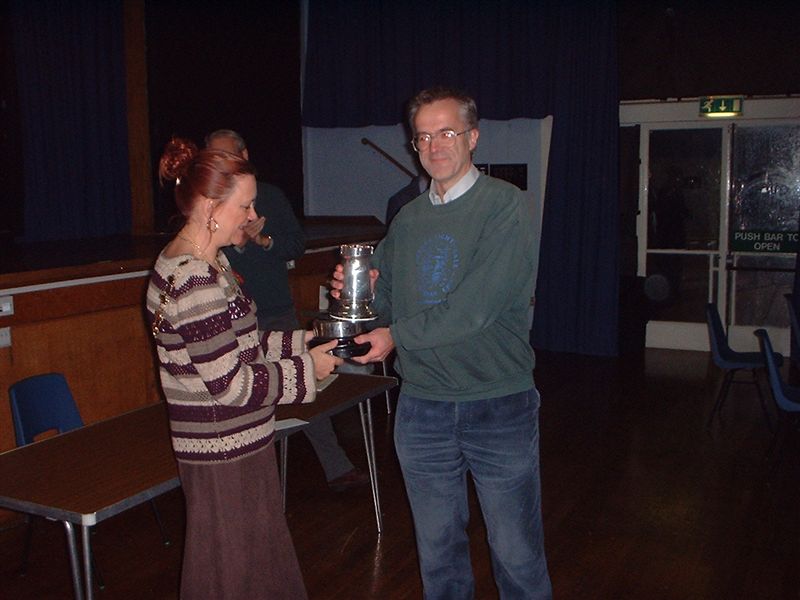
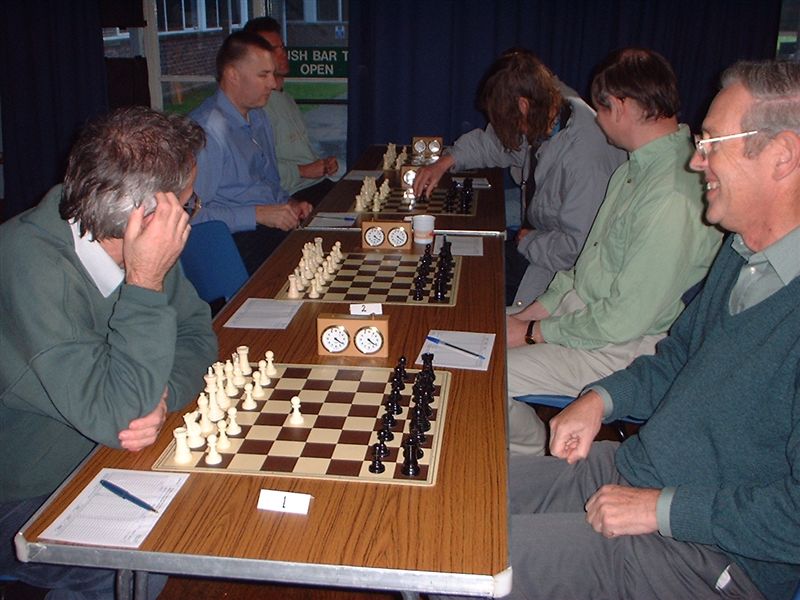

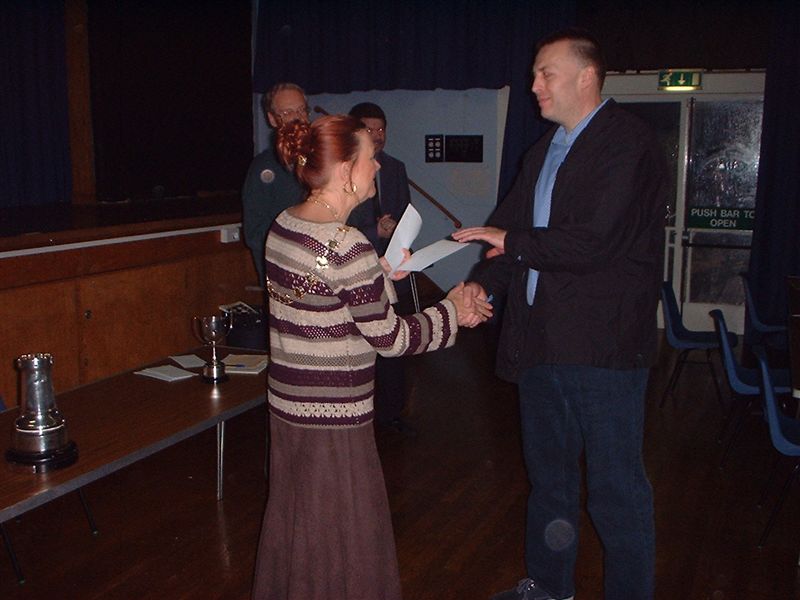

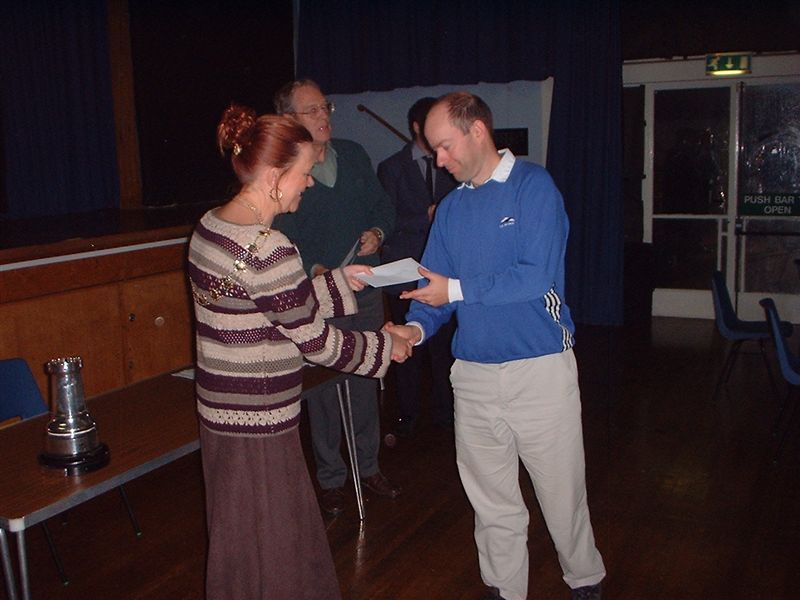

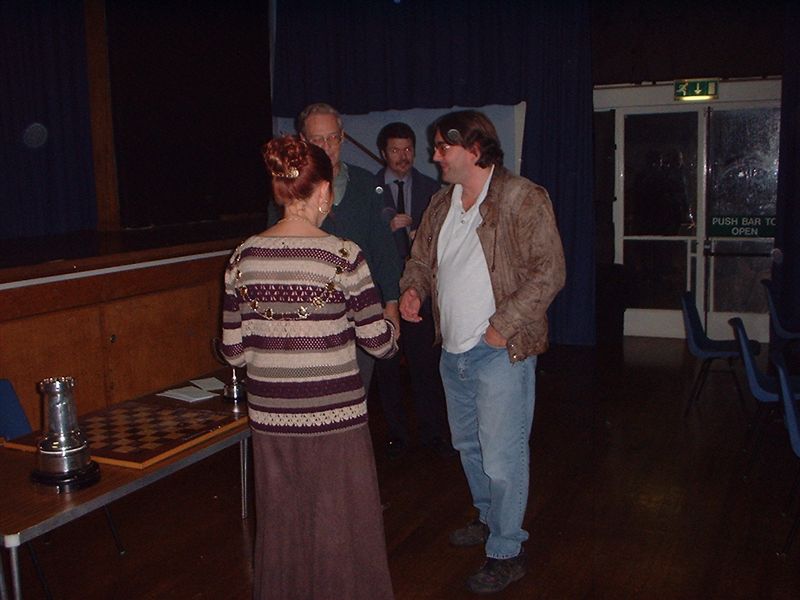
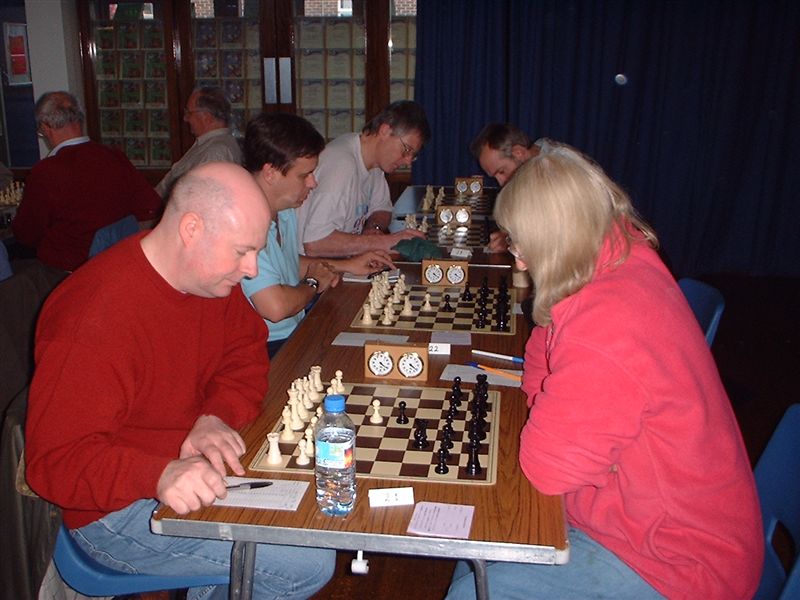
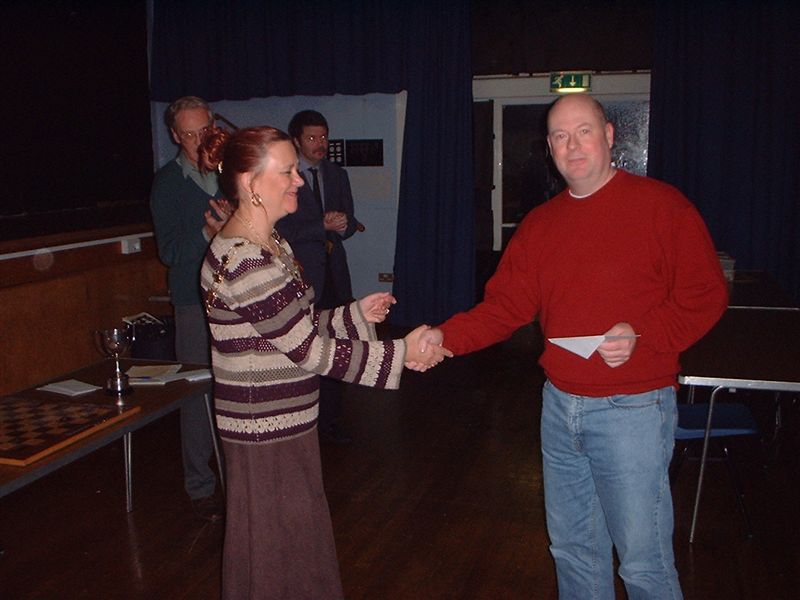
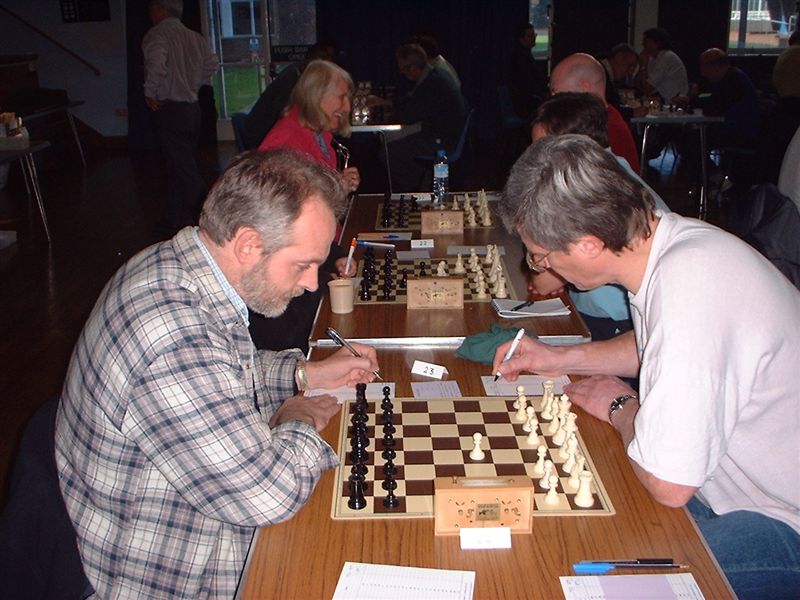
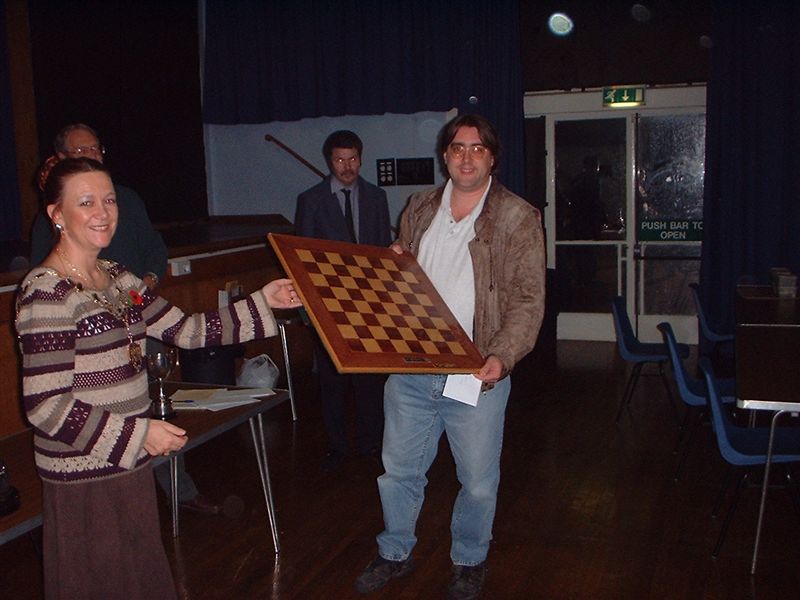
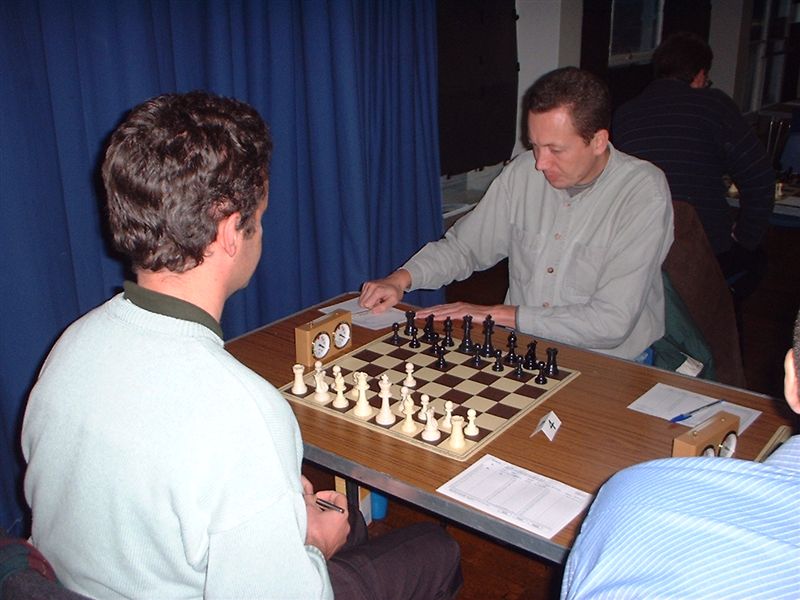
1 thought on “Hampshire Individual Chess Championship 2002”